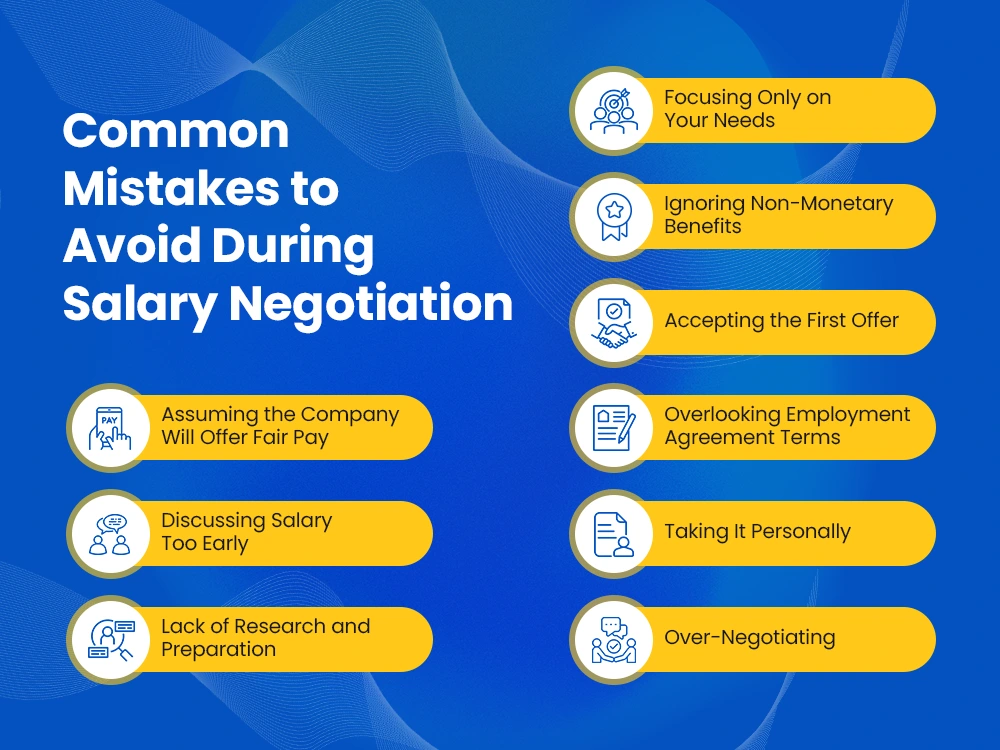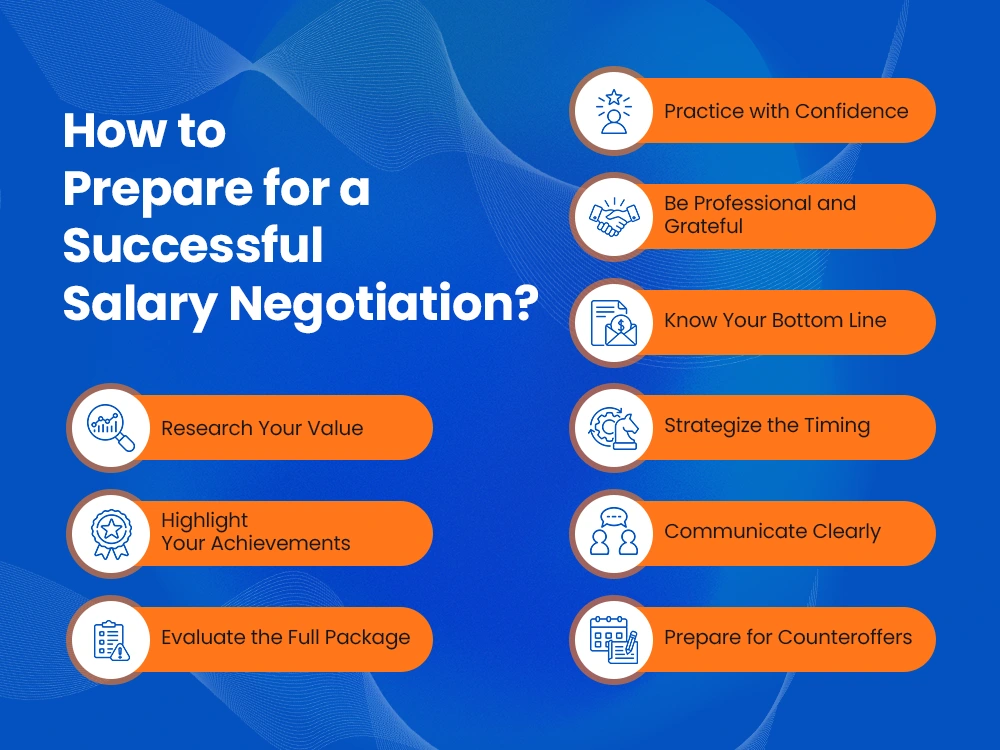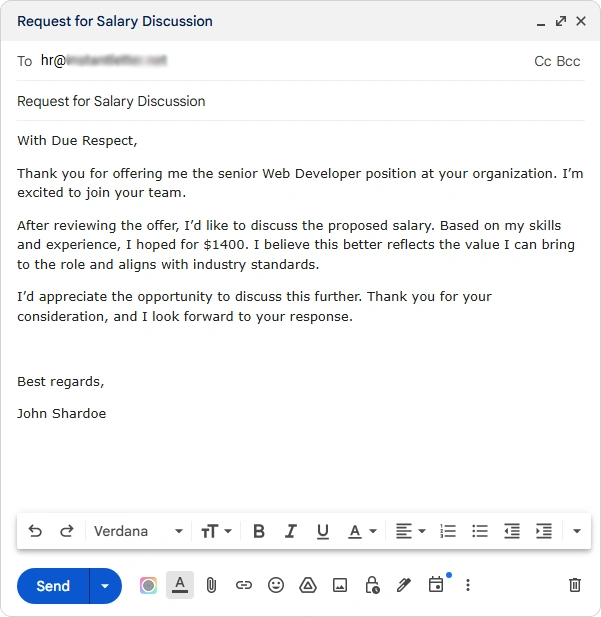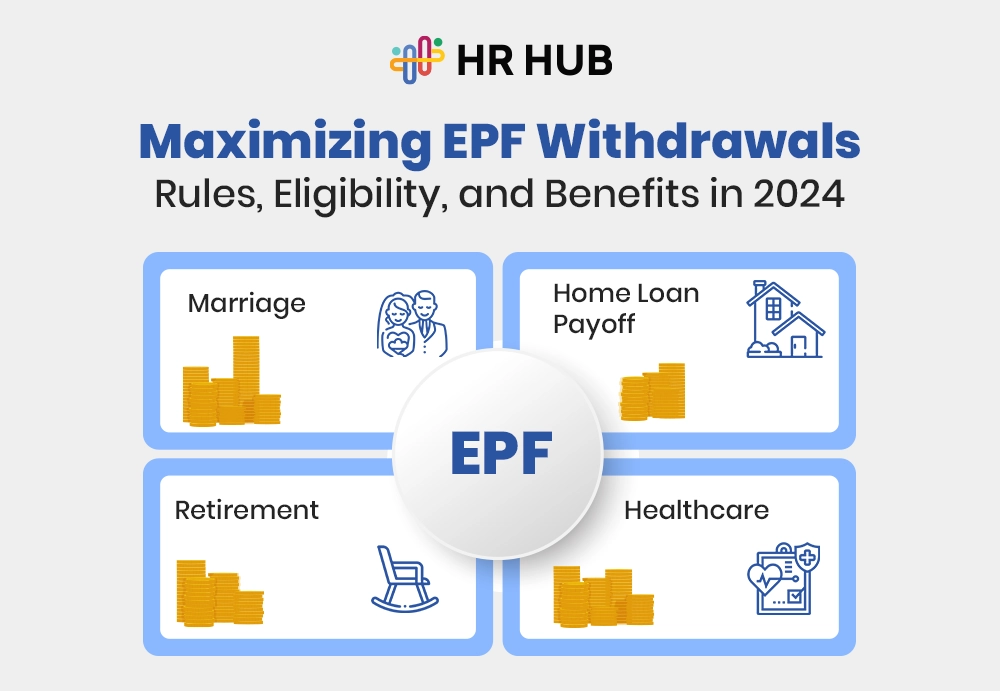While discussing money is part of the hiring process, it's easily misunderstood as an awful part of the whole situation. Most applicants are terrified of salary because they may see that discussing compensation can make their wages too demanding; to make matters worse, negotiating would risk losing the job.
However, they might get the questions in mind like:
How to negotiate salary with HR?
The outcome?
Common errors may result in underpayment, undervaluation, or an ill-fitting agreement.
This blog will outline some key mistakes to avoid and provide you with strategies to ensure your salary negotiation journey starts on the right foot.
Common Mistakes to Avoid During Salary Negotiation With HR

1. Assuming the Company Will Offer a Fair Deal
Most people will assume that companies automatically know the market rate for the position based on the job and the person's qualifications. Most employers expect applicants to negotiate. The first offer usually is a starting point rather than the final word. Not advocating for yourself could end up being underpaid, hurting your long-term financial growth and job satisfaction.
2. Rushing to Discuss Compensation
If a job candidate raises salary in a process, money comes above all the desires related to being within a new working context. However, employers want to get as much excitement about the specific role as possible, alongside their needs. Discussing the salary should usually be delayed until the employer has shown strong interest in hiring an employee, such as when providing an offer or during the final phases of interviewing.
3. Lack of Research and Preparation
You should not enter any salary discussion without knowing the average for your role, industry, and location. Thus, you might undervalue yourself or demand an unrealistic figure, jeopardizing your credibility. One can look at Glassdoor, Payscale, and LinkedIn Salary Insights benchmarks.
4. Focusing Solely on Your Needs
They're mostly interested in how you will make things better for them. Presenting your case around your financial burdens rather than value for them can greatly compromise your negotiating power. Keep talking about your exclusive skills and experience and how these relate to the company's objectives.
5. Ignoring Non-Monetary Benefits
While salary is an important part of the compensation package, it is only one component. There's health insurance, retirement contributions, flexible working hours, paid time off, professional development opportunities, and even stock options that can enhance the value of your offer. Omitting them may lead to a missed opportunity.
6. Accepting the First Offer Without Question
Accepting an initial offer without negotiation is a lost opportunity to earn more. The employers anticipate negotiation from the candidates and keep room for it in their first proposal. Countering the first offer politely demonstrates that you are aware of your value and ready to argue for it.
7. Neglecting Employment Agreement Terms
Salaries aren't just about numbers. The terms of employment have more to do with the issue of salaries. Performance metrics, severance terms, non-compete clauses, or probation periods might not be addressed and would likely become future conflicts. Thus, review the entire agreement before acceptance.
8. Taking Negotiations Personally
Negotiation should remain professional and objective. Do not take a counteroffer or rejection personally, as this may destroy the process and damage your relationship with your employer. Remember, this negotiation is about the job and your compensation, not about your worth.
9. Over-Negotiating
While it is important to have your say, being too aggressive or asking for way too many changes can frustrate the employer and jeopardize the offer. Find a delicate balance by prioritizing only your key requirements and softening where possible.
How to Prepare for a Successful Salary Negotiation?

1. Back Your Expectations with Research
Preparation is the key to negotiation success. Research the appropriate salary range for your job, industry, and region by checking credible sources such as Glassdoor, Payscale, or LinkedIn Salary Insights. These numbers will help you create a reasonable range for your negotiation. In addition, the size of the company, budget, and market conditions may influence the further refinement of your target salary.
2. Articulate Your Value
Demonstrate that skills, experience, and accomplishments align with company goals. Prepare specific examples of past successes and how they've led to organizational growth or efficiency. Highlighting quantifiable results, such as increases in revenue or cost savings realized in previous roles, increases strength and justifies the salary wanted.
3. Consider the Entire Compensation Package
Consider going beyond the base salary to determine the overall compensation package. This includes benefits such as bonuses, stock options, health insurance, retirement contributions, professional development budgets, remote work options, and paid time off. Knowing the full value offered can be useful in making informed decisions and negotiating.
4. Practice Your Pitch
Confidence is the word during salary discussions. Rehearse your pitch with a trusted friend, mentor, or career coach so that you can professionally express your expectations. Try to keep the conversation collaborative and respectful rather than aggressive.
5. Stay Professional, Even When Disappointed
Not all negotiations will be in your favor. If the employer's offer is not up to your expectations, thank them for the opportunity and maintain your professionalism. This is a perfect time to raise some of the growth opportunities or milestones that might lead to an increase in salary in the future. Positive behavior leaves a good impression and opens doors for the future.
6. Know Your Bottom Line
Determine your walk-away point before negotiating. This should show the financial needs, market, and career goals. If the last offer does not meet the baseline, there is a readiness to walk out with dignity. Knowing what not to do is a good mark of professionalism and self-respect.
7. Time Your Negotiation Strategically
Start salary discussions right after receiving a formal offer, or when your employer intends to hire you. Bringing up salary too early can throw off the conversation and lead the interviewer to believe that you're not serious about the position.
8. Keep Communication Clear and Concise
Clearly and concisely state your expectations during negotiation. Use numbers or ranges based on your research and explain why they should be granted. Do not use lengthy or emotional reasoning, as this will dilute the effect of your message.
9. Prepare for Counteroffers
Employers may react to your opening bid. Be prepared for this and identify what concessions you are willing to make. Flexibility and the willingness to listen to proposals indicate a willingness to work together toward finding a mutually beneficial solution.
Avoiding common mistakes and being well-prepared will set you up to confidently approach your salary negotiation and get a deal that reflects your worth and career goals.
Sample Salary Negotiation Letter After Job Offer

Build a Strong Start with Effective Negotiation
Salary negotiation does not have to be intimidating. Common pitfalls, preparation, and professionalism will help you secure an agreement that reflects your worth and aspirations. After all, getting started in your new role starts with confidence and informed decision-making.
HR HUB understands the importance of equipping businesses and employees with tools to deal with the technicalities of employment agreements. Never has managing these HR processes or streamlining negotiations been easier. Join the new journey with clarity and confidence. Visit HR HUB today to know how it all can be made possible.






